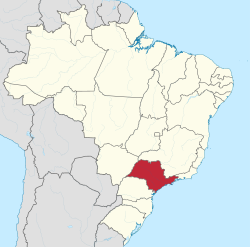Sao Paulo State
| São Paulo | |||
|---|---|---|---|
| State | |||
| Estado de São Paulo State of São Paulo |
|||
|
|||
| Motto: Pro Brasilia Fiant Eximia (Latin) "Let great things be done for Brazil" |
|||
| Anthem: Bandeirantes Anthem | |||
 Location of State of São Paulo in Brazil |
|||
| Coordinates: 23°32′S 46°38′W / 23.533°S 46.633°WCoordinates: 23°32′S 46°38′W / 23.533°S 46.633°W | |||
| Country | |||
| Capital | São Paulo | ||
| Government | |||
| • Governor | Geraldo Alckmin (PSDB) | ||
| • Vice Governor | Márcio França (PSB) | ||
| • Legislature | Legislative Assembly | ||
| Area | |||
| • Total | 248,222.8 km2 (95,839.4 sq mi) | ||
| Area rank | 12th | ||
| Population (2014) | |||
| • Total | 44,396,485 | ||
| • Rank | 1st | ||
| • Density | 180/km2 (460/sq mi) | ||
| • Density rank | 3rd | ||
| Demonym(s) | Paulista | ||
| GDP | |||
| • Year | 2015 (IBGE) | ||
| • Total | US$1 trillion (PPP) (1st) | ||
| • Per capita | US$23,000 (PPP)(2nd) | ||
| HDI | |||
| • Year | 2010 | ||
| • Category | 0.783 - high (2nd) | ||
| Time zone | BRT (UTC-3) | ||
| • Summer (DST) | BRST (UTC-2) | ||
| Postal Code | 01000-000 to 19990-000 | ||
| ISO 3166 code | BR-SP | ||
| Website | www.saopaulo.sp.gov.br | ||
São Paulo (Portuguese pronunciation: [sɐ̃w ˈpawlu]) is one of the 26 states of the Federative Republic of Brazil and is named after Saint Paul of Tarsus. As the richest Brazilian state and a major industrial complex, often dubbed the "locomotive of Brazil", the state alone is responsible for a third of the Brazilian GDP. São Paulo also has the second highest Human Development Index (HDI) and GDP per capita, the fourth lowest infant mortality rate and the third lowest rate of illiteracy among the federative units of Brazil. São Paulo alone is richer than Argentina, Uruguay, Paraguay and Bolivia combined. If São Paulo were an independent country, its nominal GDP would be ranked among the top 20 in the world (2010 estimate).
With more than 45 millions inhabitants in 2014, São Paulo is the most populous Brazilian state, the most populous national subdivision in the Americas, and the third most populous political unit of South America, surpassed only by the rest of the Brazilian Federation and Colombia. The local population is one of the most diverse in the country and descended mostly from Italians, who began immigrating to the country in the late 19th century; of the Portuguese, who colonized Brazil and installed the first European settlements in the region; indigenous peoples, a large number of distinct ethnic groups; Africans, who were brought from Africa as slaves in the colonial era and migrants from other regions of the country. In addition, Arabs, Germans, Spanish, Japanese and Chinese also are present in the ethnic composition of the local population.
...
Wikipedia


